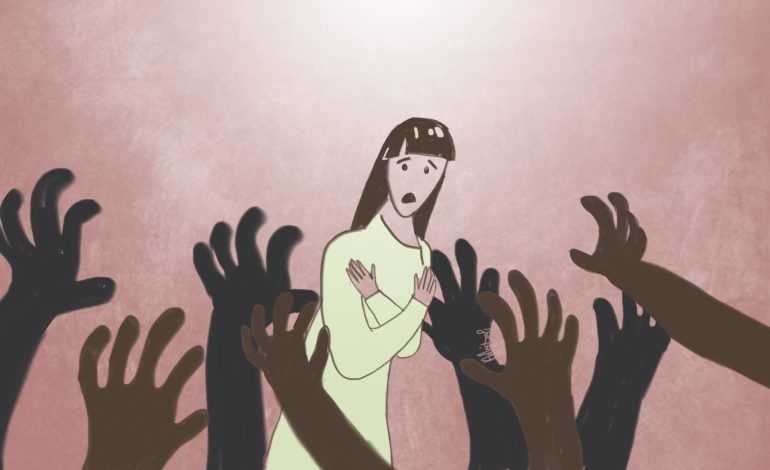Sexual Violence Against Women Brings Dire Economic Consequences

A 14 year-old junior high school student was raped by 14 men in Bengkulu province recently before she was hit in the head by timber and killed. Known only as Y, her body was found in a ditch – bruised, tied up and naked – three days after her death.
Y could well have been Indonesia’s own Jyoti Singh, whose brutal gang rape case in India a few years ago made international news and instigated nationwide rage and protest against the entrenched rape culture and poor related laws. But Y’s senseless death barely made national news. It created a ripple in the social media only after a few activists found the buried article days later, and began a campaign to support Y and raise public awareness on the situation. Why isn’t there more public more outrage about this?
Y’s case is not an anomaly. Everyday, 35 Indonesian women experience sexual violence, an equivalent to three women every two hours, according to the 2014 data from the National Commission on Violence Against Women (Komnas Perempuan). Komnas Perempuan Chairwoman Azriana R.M. said cases of sexual violence continues to increase in Indonesia and, contrary to the widely held perception, it has nothing to do with sexuality.
“Sexual violence is not always driven by sexual impulse, rather it is a form of control over women,” said Azriana in a discussion held on April 28 last week on the economic impact of sexual violence held by Lentera Indonesia, a supporting group for sexual violence survivors, and Magdalene. The discussion kicks off a seven-month long campaign to raise awareness on sexual violence in Indonesia and begin discussions on how to end the pervasive problem.
Sexual violence, Azriana said, has the most complicated impacts compared to other forms of violence against women. Apart from physical, psychological and health impacts, it also has economic dimension.
Because of the psychological repercussions and stigmas attached to survivors of sexual violence, they can lose their livelihood or access to decent jobs, which then lead to the impoverishment of the women, she added.
Psychologist and co-founder of Yayasan Pulih trauma counseling foundation, Livia Iskandar, said that students who experience sexual violence often have to drop out of school, causing them to have low level of education and making them less competent to earn good income.
“A number of sexual violence survivors are infected with HIV, a disease that has become global burden because of increased medical cost, particularly the high cost for ARV (anti-retroviral) drugs,” Livia said. “Plus, in Indonesia, psychologist is not covered by health social security (BPJS), which also adds to the cost.”
The United Nations categorizes the economic cost of sexual violence against women into four categories: direct and tangible, indirect and tangible, direct and intangible, and indirect and intangible.
Legal, medical and foster care costs are some of the direct tangible costs. Direct intangible costs are pain and suffering and the emotional loss, while indirect intangible costs include the negative psychological effects on children who witness violence.
Even more significant are the indirect tangible costs incurred by the loss of earnings and profits, the loss of human capital investment and the loss of productivity.
The World Bank notes that the loss of productivity caused by gender-based violence has been shown to have dire economic consequences, costing an estimated 3.7% of GDP, which is more than double of what most governments spend of education.
Legal Enforcement
Lawyer Pramudya A. Oktavinanda said that given the dire economic consequences, the government should improve their policies on sexual violence. He said the loss of productivity and welfare affect the country’s rank in the index of happiness, which describes how measurements of well-being can be used effectively to assess a nation’s progress. Indonesia ranks at number 79 out of 157 countries in this year’s index, down from 74 in 2015.
Conversation on the impact on sexual violence must include the economic dimension and its affect on the economic growth and happiness index to convince the government about the importance of this issue, Pramudya said.
The existing laws on sexual violence are inadequate, he said. The Criminal Code currently only has three categories of sexual violence, but, in reality, sexual violence has grown more complex and varied. He suggested a series of legal reforms starting from expanding the definition of sexual violence in the Criminal Code to amending the 1974 Marital Law, which places men in a superior position as the head of the family, to encourage a climate of gender equality.
There should also be civil sanction to ensure justice to the victims.
“There should be civil sanction that provides compensation and retribution to the victims. The legal system must give incentive for victims to take care of their rights,” Pramudya said.
The most urgent thing to do, however, is to approach legal enforcers and start talking to them about changing their perceptions and biases toward sexual violence, he said.
“The law enforcers are very biased toward women who are victims of sexual violence. They are deemed indecent women who tempt perpetrators to commit violence. The judges often ask rape victims, ‘what were you wearing?’, which is irrelevant and offensive,” he said.
“No wonder out of nearly 300,000 cases of sexual violence in the country in 2014, only 10 percent of the cases was reported.”
Azriana from Komnas Perempuan said that the victims’ access to legal protection should be improved as the existing legal aid program cannot be accessed by everyone.
“The Criminal Code Procedure gives more protection to the rights of perpetrators, while it barely mentions the rights of victims, assuming that they are protected by the state,” she said.
Komnas Perempuan is currently working on a draft of the Bill on Sexual Violence, which it will propose to the House of Representatives to deliberate this year. The bill aims to protect and recover the rights of the victims, including their access to jobs.
“It’s not easy to pass the law, because it disrupts the public’s comfort zone. We need wider support,” Azriana said.
Read the story on women being some of the worst victims in 1965 atrocities and follow @heradiani on Twitter.
To continue the conversation and support the campaign against sexual violence, visit campaign.com/mulaibicara.






















